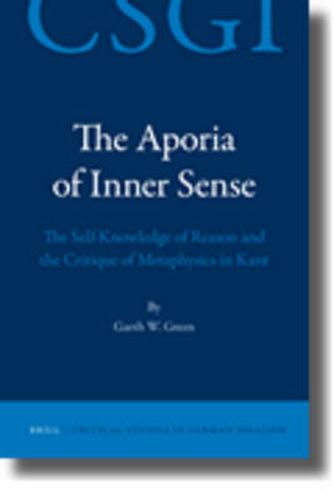Readings Newsletter
Become a Readings Member to make your shopping experience even easier.
Sign in or sign up for free!
You’re not far away from qualifying for FREE standard shipping within Australia
You’ve qualified for FREE standard shipping within Australia
The cart is loading…






This work - the first full-length account of its theme in English - identifies Kant’s doctrine of inner sense as a central, and problematic, element within the ‘architectonic of pure reason’ of the first Critique. Its exegesis exposes two, variant construals of the character and capacities of inner sense: the first, ‘positive’ construal functions in Kant’s account of the nature of knowledge in the Transcendental Analytic, while the second, ‘negative’ construal functions in Kant’s account of the limits of knowledge in the Transcendental Dialectic. Green shows how this variance underlies, and destabilizes, the basic intention of Kant’s theoretical philosophy, to give an account of both the nature, and the limits, of cognition. The work complements detailed analysis with an exhaustive review of English, French, and German scholarship on the doctrine. An Appendix on Kant’s recently discovered ‘Vom inneren Sinne’ fragment evinces Kant’s continued concern with this doctrine, and a Conclusion intimates the importance of Fichte’s and Schelling’s identification of the ‘aporia of inner sense’ to the subsequent development of transcendental idealism.
$9.00 standard shipping within Australia
FREE standard shipping within Australia for orders over $100.00
Express & International shipping calculated at checkout
This work - the first full-length account of its theme in English - identifies Kant’s doctrine of inner sense as a central, and problematic, element within the ‘architectonic of pure reason’ of the first Critique. Its exegesis exposes two, variant construals of the character and capacities of inner sense: the first, ‘positive’ construal functions in Kant’s account of the nature of knowledge in the Transcendental Analytic, while the second, ‘negative’ construal functions in Kant’s account of the limits of knowledge in the Transcendental Dialectic. Green shows how this variance underlies, and destabilizes, the basic intention of Kant’s theoretical philosophy, to give an account of both the nature, and the limits, of cognition. The work complements detailed analysis with an exhaustive review of English, French, and German scholarship on the doctrine. An Appendix on Kant’s recently discovered ‘Vom inneren Sinne’ fragment evinces Kant’s continued concern with this doctrine, and a Conclusion intimates the importance of Fichte’s and Schelling’s identification of the ‘aporia of inner sense’ to the subsequent development of transcendental idealism.